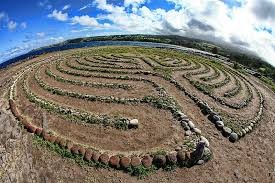What could be more useless than walking a labyrinth? Just a lot of turns and backtracking, taking up my valuable time. I like to get to the point, and have been reluctant to see the point of labyrinths, especially after once encountering at a large urban church a set of pretentious instructions for how to walk them, written by someone evidently even more controlling than myself. They told me that if I walked a labyrinth in the right frame of mind I’d be rewarded with great spiritual wisdom and insight. It sounded almost as if I’d be lifted straight up into the ether.
The church across the street from my condo building has a labyrinth in its parking lot, and early one morning when I was out walking for exercise — one of the few outdoor activities allowed during the COVID-19 pandemic — I noticed that the lot was empty of cars. I decided to give the labyrinth a try. Forcing myself to walk much slower than normal, I received no lightning bolts or astonishments, but I did leave with a sense of peace that helped me to face the day. I’ve been back every day since.
What’s the point of walking a labyrinth? Why sit for forty-five minutes in a zendo? Or pray the psalms six times a day in a monastery choir? What is the point of a Sabbath? The point may be that there is no point, but only the value of experiencing an unaccustomed stillness that can open our minds and hearts to what is truly important in life.
Enjoying a Sabbath can be hard for people who are goal-oriented and just want to get things done as quickly and efficiently as possible. But that attitude can be risky. If we reject the idea of “doing nothing” on the Sabbath, we can easily slide into despair, feeling that that there is nothing worth doing. Now that so many of us have been forced into a monk-like existence at home, our capacity to appreciate a Sabbath has become more important than ever.
Sabbath is a gift, and I’m indebted to the writer Dorothy Bass for reminding me that in the Biblical narrative of Israel’s exodus from Egypt, it is a gift that can be enjoyed only by a free people. People enslaved by workaholism, or the hard necessity of laboring at a minimum wage job; people enslaved by addictions, or the plentiful distractions offered by a consumer culture, will have a difficult time receiving a Sabbath rest.
A Benedictine monk recently wrote to me about the disruptions in his life caused by the pandemic, expressing a hope that “this unexpected Sabbath will prove to be a blessing.” Although his work routine has been upended, and he’s had to cancel trips to academic conferences, he’s inclined to view the experience as a chance given to him by God to take a fresh look at his life.
My own “fresh look” involves discovering more about the neighborhood I’ve called home for twenty years, enjoying the plants that people are carefully tending, and some that run a little wild. A flowering shrub or tree I’ve never noticed before will seem to shout at me: “I’m here ! I’m alive! I’m beautiful!” I am also meandering every morning along a labyrinth, taking reversals in stride, and trying not to think about when I’ll reach the end.




